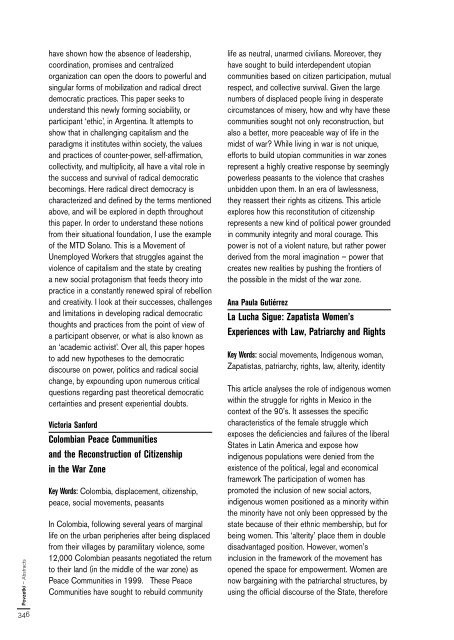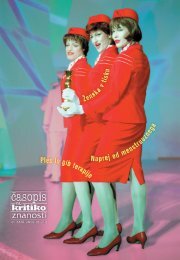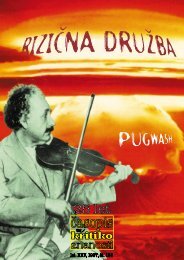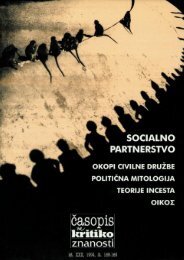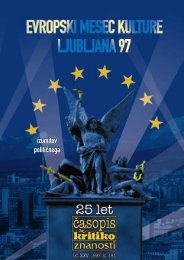ZapatistiËna vojska nacionalne osvoboditve (EZLN ... - AirBeletrina
ZapatistiËna vojska nacionalne osvoboditve (EZLN ... - AirBeletrina
ZapatistiËna vojska nacionalne osvoboditve (EZLN ... - AirBeletrina
Create successful ePaper yourself
Turn your PDF publications into a flip-book with our unique Google optimized e-Paper software.
Povzetki ‡ Abstracts<br />
346<br />
have shown how the absence of leadership,<br />
coordination, promises and centralized<br />
organization can open the doors to powerful and<br />
singular forms of mobilization and radical direct<br />
democratic practices. This paper seeks to<br />
understand this newly forming sociability, or<br />
participant ‘ethic’, in Argentina. It attempts to<br />
show that in challenging capitalism and the<br />
paradigms it institutes within society, the values<br />
and practices of counter-power, self-affirmation,<br />
collectivity, and multiplicity, all have a vital role in<br />
the success and survival of radical democratic<br />
becomings. Here radical direct democracy is<br />
characterized and defined by the terms mentioned<br />
above, and will be explored in depth throughout<br />
this paper. In order to understand these notions<br />
from their situational foundation, I use the example<br />
of the MTD Solano. This is a Movement of<br />
Unemployed Workers that struggles against the<br />
violence of capitalism and the state by creating<br />
a new social protagonism that feeds theory into<br />
practice in a constantly renewed spiral of rebellion<br />
and creativity. I look at their successes, challenges<br />
and limitations in developing radical democratic<br />
thoughts and practices from the point of view of<br />
a participant observer, or what is also known as<br />
an ‘academic activist’. Over all, this paper hopes<br />
to add new hypotheses to the democratic<br />
discourse on power, politics and radical social<br />
change, by expounding upon numerous critical<br />
questions regarding past theoretical democratic<br />
certainties and present experiential doubts.<br />
Victoria Sanford<br />
Colombian Peace Communities<br />
and the Reconstruction of Citizenship<br />
in the War Zone<br />
Key Words: Colombia, displacement, citizenship,<br />
peace, social movements, peasants<br />
In Colombia, following several years of marginal<br />
life on the urban peripheries after being displaced<br />
from their villages by paramilitary violence, some<br />
12,000 Colombian peasants negotiated the return<br />
to their land (in the middle of the war zone) as<br />
Peace Communities in 1999. These Peace<br />
Communities have sought to rebuild community<br />
life as neutral, unarmed civilians. Moreover, they<br />
have sought to build interdependent utopian<br />
communities based on citizen participation, mutual<br />
respect, and collective survival. Given the large<br />
numbers of displaced people living in desperate<br />
circumstances of misery, how and why have these<br />
communities sought not only reconstruction, but<br />
also a better, more peaceable way of life in the<br />
midst of war? While living in war is not unique,<br />
efforts to build utopian communities in war zones<br />
represent a highly creative response by seemingly<br />
powerless peasants to the violence that crashes<br />
unbidden upon them. In an era of lawlessness,<br />
they reassert their rights as citizens. This article<br />
explores how this reconstitution of citizenship<br />
represents a new kind of political power grounded<br />
in community integrity and moral courage. This<br />
power is not of a violent nature, but rather power<br />
derived from the moral imagination — power that<br />
creates new realities by pushing the frontiers of<br />
the possible in the midst of the war zone.<br />
Ana Paula Gutiérrez<br />
La Lucha Sigue: Zapatista Women’s<br />
Experiences with Law, Patriarchy and Rights<br />
Key Words: social movements, Indigenous woman,<br />
Zapatistas, patriarchy, rights, law, alterity, identity<br />
This article analyses the role of indigenous women<br />
within the struggle for rights in Mexico in the<br />
context of the 90’s. It assesses the specific<br />
characteristics of the female struggle which<br />
exposes the deficiencies and failures of the liberal<br />
States in Latin America and expose how<br />
indigenous populations were denied from the<br />
existence of the political, legal and economical<br />
framework The participation of women has<br />
promoted the inclusion of new social actors,<br />
indigenous women positioned as a minority within<br />
the minority have not only been oppressed by the<br />
state because of their ethnic membership, but for<br />
being women. This ‘alterity’ place them in double<br />
disadvantaged position. However, women’s<br />
inclusion in the framework of the movement has<br />
opened the space for empowerment. Women are<br />
now bargaining with the patriarchal structures, by<br />
using the official discourse of the State, therefore


